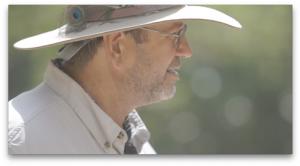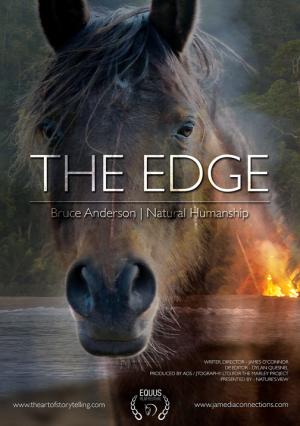By Julianne Neal, The Marley Project, Inc.
“The Edge: Bruce Anderson - Natural Humanship” film trailer was presented the Prix de Finalist Award in the category of Social Responsibility during the Deauville Green Awards, held in France in June, 2016. The film trailer, a 4 minute preview of the 45 minute documentary currently in production with Director James O’Connor and Dylan Quesnel of The Art of Storytelling, details the work of Bruce Anderson, native of Trinidad and Tobago and current resident of Camden, South Carolina. Anderson is the founder of Nature’s View, a unique system of equine learning that he calls “natural humanship,” and is one of the founders of The Marley Project, Inc. (TMP), a 501(c)(3) dedicated to equine education.
Anderson and Julianne Neal, Executive Director of TMP, presented the film and introduced the work during the international festival. Official selections from five continents were nominated by the international jury to be screened in the presence of the teams to compete for Green Awards. The 100 finalists’ films distributed in three competitions and 14 thematic categories were awarded the Gold Green Awards, the Special Awards and the Grand Prix, rewarding excellence in production and broadcasting for sustainable development on Thursday, June 16th at the Salon des Ambassadeurs Casino Barrière.
For five years, the festival has rewarded excellence in the field of audio-visual communication on sustainable development, eco-innovations and social responsibility. “The 300 films in competition are all open windows to the world of tomorrow,” according to festival organizers. Jean Jouzel, sponsor of the 2016 festival and holder of the Nobel Peace Prize with the IPCC in 2007, closed the ceremony and its many workshops, roundtables and screenings with the optimistic view that "We have the potential in terms of solutions!”
The Green Awards, under the leadership of the COP21, highlighted many key points during the festival celebrations, including numerous trends and innovative initiatives from the four corners of the world. Films in documentary, corporate film and advertisement categories were featured through such diverse topics as smart-cities, urban farms, equine/animal related solutions and composting art.
Special presentations included an EcoProd workshop on ecological improvements for the audio-visual sector, as well as a symposium on “accelerating practical change” with a presentation on a revolutionary hydrogen scooter. The record numbers, in terms of attendance for the fifth edition, clearly confirm the trend of responsible production, sustainable development, eco-innovations and social responsibility.
Many personalities also support the festival in its awareness: Arnold Schwarzenegger, Jerry Brown, and Jane Goodall all intervened for the festival at the Grand Palais during the COP21.
“The Edge” documents Anderson’s life travels, from the Caribbean islands through England and Canada, finally landing in the Southeastern United States, painting a backdrop for the foundation of his work. His system includes a step by step process that can be applied to a variety of situations and circumstances, including equine training, equine assisted learning and therapy, law enforcement training, management and educational workshops. Anderson also explores environmental and societal issues facing the world today and gives his solution of the AlphA, or servant leader, mindset.
Far from being a doomsday prophet, Anderson provides an alternative philosophy of “People Helping Horses: Horses Helping People” while addressing human needs for survival through the environment.
The research for the film also explores his work in the Abacos with Milanne Rehor and Nunki, the last horse in the line of Spanish Colonials descending from the breed brought to the New World by Christopher Columbus. Although Nunki died in July 2015, Anderson’s work with Wild Horses of Abaco has spanned 2014 through the present and continues through cloning efforts in order to restore the breed on the current island Preserve. He sees this situation as a “canary in the coal mine” of humanity, showing where we are as a society. The WHOA team submitted a proposal to the Government of the Bahamas in October to bring back the Abaco Spanish Colonial Horses using Nunki’s tissue. This is reportedly the first time that an extinct breed will be brought back; other equine restorations have been based on small remaining populations. Since the Spanish Colonial breed is becoming rarer, reintroduction of even a part of the gene pool of the Abacos will do much to reverse the march of the Spanish Colonial toward the edge of extinction.
O’Connor and Quesnel have a projected completion date for the 45 minute documentary of June 30th and plans are in place for submitting the film to the EQUUS Film Festival NYC in November 2016. To see The Edge, visit www.vimeo.com/161533904. Find more about Bruce Anderson and his work with horses at: http://www.equusencounter.com/
“The Edge: Bruce Anderson - Natural Humanship” film trailer was presented the Prix de Finalist Award in the category of Social Responsibility during the Deauville Green Awards, held in France in June, 2016. The film trailer, a 4 minute preview of the 45 minute documentary currently in production with Director James O’Connor and Dylan Quesnel of The Art of Storytelling, details the work of Bruce Anderson, native of Trinidad and Tobago and current resident of Camden, South Carolina. Anderson is the founder of Nature’s View, a unique system of equine learning that he calls “natural humanship,” and is one of the founders of The Marley Project, Inc. (TMP), a 501(c)(3) dedicated to equine education.
Anderson and Julianne Neal, Executive Director of TMP, presented the film and introduced the work during the international festival. Official selections from five continents were nominated by the international jury to be screened in the presence of the teams to compete for Green Awards. The 100 finalists’ films distributed in three competitions and 14 thematic categories were awarded the Gold Green Awards, the Special Awards and the Grand Prix, rewarding excellence in production and broadcasting for sustainable development on Thursday, June 16th at the Salon des Ambassadeurs Casino Barrière.
For five years, the festival has rewarded excellence in the field of audio-visual communication on sustainable development, eco-innovations and social responsibility. “The 300 films in competition are all open windows to the world of tomorrow,” according to festival organizers. Jean Jouzel, sponsor of the 2016 festival and holder of the Nobel Peace Prize with the IPCC in 2007, closed the ceremony and its many workshops, roundtables and screenings with the optimistic view that "We have the potential in terms of solutions!”
The Green Awards, under the leadership of the COP21, highlighted many key points during the festival celebrations, including numerous trends and innovative initiatives from the four corners of the world. Films in documentary, corporate film and advertisement categories were featured through such diverse topics as smart-cities, urban farms, equine/animal related solutions and composting art.
Special presentations included an EcoProd workshop on ecological improvements for the audio-visual sector, as well as a symposium on “accelerating practical change” with a presentation on a revolutionary hydrogen scooter. The record numbers, in terms of attendance for the fifth edition, clearly confirm the trend of responsible production, sustainable development, eco-innovations and social responsibility.
Many personalities also support the festival in its awareness: Arnold Schwarzenegger, Jerry Brown, and Jane Goodall all intervened for the festival at the Grand Palais during the COP21.
“The Edge” documents Anderson’s life travels, from the Caribbean islands through England and Canada, finally landing in the Southeastern United States, painting a backdrop for the foundation of his work. His system includes a step by step process that can be applied to a variety of situations and circumstances, including equine training, equine assisted learning and therapy, law enforcement training, management and educational workshops. Anderson also explores environmental and societal issues facing the world today and gives his solution of the AlphA, or servant leader, mindset.
Far from being a doomsday prophet, Anderson provides an alternative philosophy of “People Helping Horses: Horses Helping People” while addressing human needs for survival through the environment.
The research for the film also explores his work in the Abacos with Milanne Rehor and Nunki, the last horse in the line of Spanish Colonials descending from the breed brought to the New World by Christopher Columbus. Although Nunki died in July 2015, Anderson’s work with Wild Horses of Abaco has spanned 2014 through the present and continues through cloning efforts in order to restore the breed on the current island Preserve. He sees this situation as a “canary in the coal mine” of humanity, showing where we are as a society. The WHOA team submitted a proposal to the Government of the Bahamas in October to bring back the Abaco Spanish Colonial Horses using Nunki’s tissue. This is reportedly the first time that an extinct breed will be brought back; other equine restorations have been based on small remaining populations. Since the Spanish Colonial breed is becoming rarer, reintroduction of even a part of the gene pool of the Abacos will do much to reverse the march of the Spanish Colonial toward the edge of extinction.
O’Connor and Quesnel have a projected completion date for the 45 minute documentary of June 30th and plans are in place for submitting the film to the EQUUS Film Festival NYC in November 2016. To see The Edge, visit www.vimeo.com/161533904. Find more about Bruce Anderson and his work with horses at: http://www.equusencounter.com/









